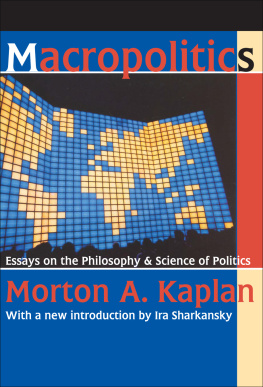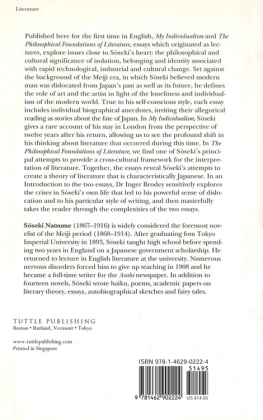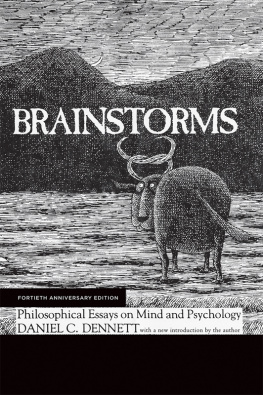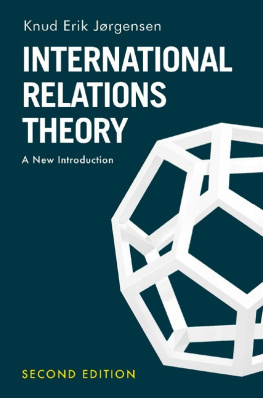First published 1969 by Transaction Publishers
Published 2017 by Routledge
2 Park Square, Milton Park, Abingdon, Oxon OX14 4RN
711 Third Avenue, New York, NY 10017, USA
Routledge is an imprint of the Taylor & Francis Group, an informa business
New material this edition copyright 2005 by Taylor & Francis.
Copyright 1969 by Morton A. Kaplan.
All rights reserved. No part of this book may be reprinted or reproduced or utilised in any form or by any electronic, mechanical, or other means, now known or hereafter invented, including photocopying and recording, or in any information storage or retrieval system, without permission in writing from the publishers.
Notice:
Product or corporate names may be trademarks or registered trademarks, and are used only for identification and explanation without intent to infringe.
Library of Congress Catalog Number: 2005048520
Library of Congress Cataloging-in-Publication Data
Kaplan, Morton A.
Macropolitics : essays on the philosophy and science of politics / Morton A. Kaplan ; with a new introduction by Ira Sharkansky.
p. cm.
Originally published: Chicago : Aldine Pub. Co., 1969. With new introd. Includes bibliographical references and index.
ISBN 0-202-30804-9 (pbk. : alk. paper)
Political science. 2. Political sciencePhilosophy. 3. International relationsPhilosophy. I. Title.
JA71.K28 2005
320'.01'1dc22 2005048520
ISBN 13: 978-0-202-30804-3 (pbk)
To Axiewith loveContents
Acknowledgments
The author wishes to thank Alan Gewirth, Duncan MacRae, Jr., Nathan Leites, Donald Reinken, and Charles Wegener for helpful comments on an earlier draft of the philosophical essay presented in this volume.
I am grateful to those below for permission to republish the following items: to World Politics for Traditionalism versus Science in International Relations, October 1966 (Copyright 1966 by Princeton University Press), and The International Arena as a Source of Dysfunctional Tension, July 1954 (Copyright 1954 by Princeton University Press).
to James C. Charlesworth for Systems Theory from Contemporary Political Analysis (Copyright 1967 by the Free Press).
to Social Research (Spring 1968) for Systems Theory and Political Science (Copyright 1968 by The New School for Social Research).
to Ethics Journal, Vol. 70, pp. 228-32 (Copyright i960 by the University of Chicago Press) for Some Problems of the Extreme Utilitarian Position; and Vol. 71, pp. 301-02 (Copyright 1961 by the University of Chicago Press) for Restricted Utilitarianism.
to John Wiley for the two appendices and the chapter on the national interest from System and Process in International Politics (Copyright 1957 by John Wiley and Sons, Inc.).
to the Hudson Institute for A Nightmare from Herman Kahn and Anthony J. Wiener, The Year 2000 (Copyright 1967 by the Hudson Institute, Inc.).
to the Center of International Studies, for The Communist Coup in Chechoslovakia, Research Monograph Number 5, January i960 (Copyright i960 by the Center for International Studies, Princeton University).
to St. Martins Press for The Systems Approach to International Politics from Kaplan, The New Approaches to International Relations (Copyright 1968 St. Martins Press, Inc.).
to Doubleday for Some Problems of International Systems Research from International Political Communities (Copyright 1966 by Doubleday & Company, Inc.).
Aldinetransaction
Introduction
The world has changed a great deal since 19541968, when Morton A. Kaplan composed the essays that make up the chapters of this book. Recently we have worried more about North Koreas nuclear weapons and its capacity to wreak worldwide mayhem than the possibility of another conventional invasion of South Korea. Soviet incursions into East Germany, Czechoslovakia, and Hungary are ancient history. Russian authorities seem to have accepted what is to them a second-choice government put in office by something that looks like democracy in the Ukraine. The United States is bogged down in Iraq, partly because it no longer has to worry about the response of a competing great power. Yet it is in Iraq on account of American vulnerability to violence originating in the Middle East. Globalization has proceeded to the point that telephone calls made in the United States to American corporations are answered in India, and Chinese factories are clothing Americans and Europeans.
Macropolitics does not offer a detailed map to these events, but it was a milestone on our quest for understanding. Most prominent is Kaplans preoccupation with international relations. The concern for other countries and international organizations is awesome in the case of a small country that is troubled and accused of being troublesome, like Israel. Even residents in the lone great power cannot ignore the economics and the hatreds that come from overseas.More than 100 other countries fit not so much into categories of more or less dependence on international relations, as their dependence on different kinds of international pressures, opportunities, and constraints.
Thanks in considerable part to the contributions of Professor Kaplan, international relations theory is a major component of political science. For some, to be sure, it is less satisfying than the kind of detailed case analyses that Kaplan also included in Macropolitics. The scholar who reviewed the book in the American Political Science Review gave great praise to these. His treatment [s] ... of the Communist coup in Czechoslovakia... and the Chinese intervention in Korea ... are excellent: his weighing against the evidence of competing hypotheses is truly exemplarythorough, careful, fair-minded. The same reviewer employed what he called some rather vigorous adverse criticism about chapters more theoretical and philosophical.
The value of general theory remains an open and debated issue in international relations, as in political science generally. Theory can help only so much if all politics is local, and if much of international relations are the fluid pursuits of national interest. Yet if all politics is nothing more than personal or institutional rivalries, political science would not have attained the richness of Aristotle, Harold D. Lasswell, Morton A. Kaplan, and the most promising of recent Ph.D.s embarking on their careers.
Macropolitics is one landmark in Kaplans long and productive career. Research libraries catalog more than fifty of his books. The field to which he contributed has changed along with the details of international politics, and will continue to reflect events along with arguments among academics about their meaning.
As I re-read the items in this book, it is clear that Kaplan viewed his work as tentative. He realized that he was taking part in an ongoing discourse. He expresses profound respect for science, but a wise view about the limits of social science. He knows that his is not the last word. Nothing is. In The Systems Approach to International Politics, Kaplan emphasizes the need for case studies to test propositions derived from theory. He mentions striving in the last sentence of Glimpses into a Philosophy of Politics. The point is that analysts must continue to pursue understanding, knowing that their work is likely to be revised by themselves or others. This book is a distinguished part of the ongoing record.










